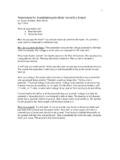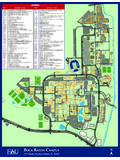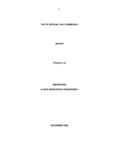Transcription of THE STATE versus T MAKWANYANE AND M MCHUNU …
1 IN THE CONSTITUTIONAL COURT OF THE REPUBLIC OF south africa Case No. CCT/3/94 In the matter of: THE STATE versus T MAKWANYANE AND M MCHUNU Heard on: 15 February to 17 February 1995 Delivered on: 6 June 1995 _____ JUDGMENT _____ [1] CHASKALSON P: The two accused in this matter were convicted in the Witwatersrand Local Division of the Supreme Court on four counts of murder, one count of attempted murder and one count of robbery with aggravating circumstances. They were sentenced to death on each of the counts of murder and to long terms of imprisonment on the other counts. They appealed to the Appellate Division of the Supreme Court against the convictions and sentences. The Appellate Division dismissed the appeals against the convictions and came to the conclusion that the circumstances of the murders were such that the accused should receive the heaviest sentence permissible according to law.
2 [2] Section 277(1)(a) of the Criminal Procedure Act No. 51 of 1977 prescribes that the death penalty is a competent sentence for murder. Counsel for the accused was invited by the Appellate Division to consider whether this provision was consistent with the Republic of south africa Constitution, 1993, which had come into force subsequent to the conviction and sentence by the trial court. He argued that it was not, contending that it was in conflict with the provisions of sections 9 and 11(2) of 1 the Constitution. [3] The Appellate Division dismissed the appeals against the sentences on the counts of attempted murder and robbery, but postponed the further hearing of the appeals against the death sentence until the constitutional issues are decided by this Court. See: S v MAKWANYANE en n Ander 1994 (3) SA 868 (A). Two issues were raised: the constitutionality of section 277(1)(a) of the Criminal Procedure Act, and the implications of section 241(8) of the Constitution.
3 Although there was no formal reference of these issues to this Court in terms of section 102(6) of the Constitution, that was implicit in the judgment of the Appellate Division, and was treated as such by the parties. [4] The trial was concluded before the 1993 Constitution came into force, and so the question of the constitutionality of the death sentence did not arise at the trial. Because evidence which might possibly be relevant to that issue would not have been led, we asked counsel appearing before this Court to consider whether evidence, other than undisputed information placed before us in argument, would be relevant to the determination of the question referred to us by the Appellate Division. Apart from the issue of public opinion, with which I will deal later in this judgment, counsel were not able to point to specific material that had not already been placed before us which might be relevant to the decision on the constitutional issues raised in this case.
4 I am satisfied that no good purpose would be served by referring the case back to the trial court for the hearing of further evidence and that we should deal with the matter on the basis of the information and arguments that have been presented to us. [5] It would no doubt have been better if the framers of the Constitution had stated specifically, either that the death sentence is not a competent penalty, or that it is permissible in circumstances sanctioned by law. This, however, was not done and it has been left to this Court to decide whether the penalty is consistent with the provisions of the Constitution. That is the extent and limit of the Court's power in this case. 2 [6] No executions have taken place in south africa since There are apparently over 300 persons, and possibly as many as 400 if persons sentenced in the former Transkei, Bophuthatswana and Venda are taken into account, who have been sentenced to death by the Courts and who are on death row waiting for this issue to be resolved.
5 Some of these convictions date back to 1988, and approximately half of the persons on death row were sentenced more than two years This is an intolerable situation and it is essential that it be resolved one way or another without further The Relevant Provisions of the Constitution [7] The Constitution 1 The last execution in south africa occurred on 14 November 1989. See infra note 26. 2 This information was contained in the written argument filed on behalf of the south African Government and was not disputed. 3 The mental anguish suffered by convicted persons awaiting the death sentence is well documented. A prolonged delay in the execution of a death sentence may in itself be cause for the invalidation of a sentence of death that was lawfully imposed. In India, Zimbabwe and Jamaica, where the death sentence is not unconstitutional, sentences of death have been set aside on these grounds.
6 The relevant authorities are collected and discussed by Gubbay CJ in Catholic Commission for Justice and Peace in Zimbabwe v Attorney-General, Zimbabwe and Others 1993 (4) SA 239 (ZSC), and by Lord Griffiths in Pratt v Attorney-General for Jamaica [1993] 3 WLR 995 (JPC). 3 .. provides a historic bridge between the past of a deeply divided society characterised by strife, conflict, untold suffering and injustice, and a future founded on the recognition of human rights, democracy and peaceful co-existence and development opportunities for all south Africans, irrespective of colour, race, class, belief or It is a transitional constitution but one which itself establishes a new order in south africa ; an order in which human rights and democracy are entrenched and in which the Constitution: .. shall be the supreme law of the Republic and any law or act inconsistent with its provisions shall, unless otherwise provided expressly or by necessary implication in this Constitution, be of no force and effect to the extent of the [8] Chapter Three of the Constitution sets out the fundamental rights to which every person is entitled under the Constitution and also contains provisions dealing with the way in which the Chapter is to be interpreted by the Courts.
7 It does not deal specifically with the death penalty, but in section 11(2), it prohibits "cruel, inhuman or degrading treatment or punishment." There is no definition of what is to be regarded as "cruel, inhuman or degrading" and we therefore have to give meaning to these words ourselves. 4 These words are taken from the first paragraph of the provision on National Unity and Reconciliation with which the Constitution concludes. Section 232(4) provides that for the purposes of interpreting the Constitution, this provision shall be deemed to be part of the substance of the Constitution, and shall not have a lesser status than any other provision of the Constitution. 5 Section 4(1) of the Constitution. 4 [9] In S v Zuma and Two Others,6 this Court dealt with the approach to be adopted in the interpretation of the fundamental rights enshrined in Chapter Three of the Constitution.
8 It gave its approval to an approach which, whilst paying due regard to the language that has been used, is "generous" and "purposive" and gives expression to the underlying values of the Constitution. Kentridge AJ, who delivered the judgment of the Court, referred with approval7 to the following passage in the Canadian case of R v Big M Drug Mart Ltd: The meaning of a right or freedom guaranteed by the Charter was to be ascertained by an analysis of the purpose of such a guarantee; it was to be understood, in other words, in the light of the interests it was meant to protect. In my view this analysis is to be undertaken, and the purpose of the right or freedom in question is to be sought by reference to the character and larger objects of the Charter itself, to the language chosen to articulate the specific right or freedom, to the historical origins of the concept enshrined, and where applicable, to the meaning and purpose of the other specific rights and freedoms with which it is associated within the text of the Charter.
9 The interpretation should generous rather than legalistic one, aimed at fulfilling the purpose of a guarantee and securing for individuals the full benefit of the Charter's 6 Constitutional Court Case No. CCT/5/94 (5 April 1995). 7 Id. at para. 15. 8 (1985) 13 CRR 64 at 103. As O'Regan J points out in her concurring judgment, there may possibly be instances where the "generous" and "purposive" interpretations do not coincide. That problem does not arise in the present case. 5 [10] Without seeking in any way to qualify anything that was said in Zuma's case, I need say no more in this judgment than that section 11(2) of the Constitution must not be construed in isolation, but in its context, which includes the history and background to the adoption of the Constitution, other provisions of the Constitution itself and, in particular, the provisions of Chapter Three of which it is It must also be construed in a way which secures for "individuals the full measure" of its Rights with which section 11(2)
10 Is associated in Chapter Three of the Constitution, and which are of particular importance to a decision on the constitutionality of the death penalty are included in section 9, "every person shall have the right to life", section 10, "every person shall have the right to respect for and protection of his or her dignity", and section 8, "every person shall have the right to equality before the law and to equal protection of the law." Punishment must meet the requirements of sections 8, 9 and 10; and this is so, whether these sections are treated as giving meaning to Section 11(2) or as prescribing separate and independent standards with which all punishments must [11] Mr. Bizos, who represented the south African government at the hearing of this matter, informed us that the government accepts that the death penalty is a cruel, inhuman and degrading punishment and that it should be declared unconstitutional. The Attorney General of the Witwatersrand, whose office is independent of the government, took a different view, and contended that the death penalty is a necessary and acceptable form of punishment and that it is not cruel, inhuman or degrading within the meaning of section 11(2).
















![p éu ; s ´ m [Purusha Suktam] Introduction - Carleton](/cache/preview/d/7/1/4/e/8/d/c/thumb-d714e8dc8e32b8aac4bd3048e8c281f0.jpg)
